O, Wanderess, Wanderess, When did you feel your most euphoric kiss? Was I the source of your greatest bliss? - Roman Payne
9 January 2020, Dabiss, GUINEA to Gillage, GUINEA-BISSAU, 65.9km
Private hut 3,000XOF (R73)
Exchange rate: Rand 1 (R): West African Franc 40.87 (XOF)
The West African franc is the currency of eight independent states in West Africa: Benin, Burkina Faso, Guinea-Bissau, Ivory Coast, Mali, Niger, Senegal and Togo
Getting lost is always disheartening; getting lost on a bicycle can be a truly horrible experience. But today, despite taking a wrong turn, adding many unintended kms to our route, and ending the day exhausted and hungry, we were glad to have lost our way. What a ride!
It began and ended on dirt. After coffee, we departed Dabiss, headed northwest to the border. At about the halfway mark, a rope stretched across the road, rag strips a-flutter on it, bringing us to a stop at a small wood structure where a single smiling official entered our passport details in his logbook and stamped our passports, officially exiting us from Guinea (Conakry) some kms before the border.
Not long thereafter, we were brought to a halt by a considerably more effective barrier, the wide Kogon river. Here the cable ferry or pont, intended to transport cars and trucks across the water, lay partially submerged and useless. But three or four wooden pirogues (canoes) were available for hire by pedestrians and bikers and those moving goods to or from the cities of Guinea. A truck stood on the ramp on our side of the river and while we watched a pirogue, rowed by a single man, arrived laden with a motorbike, two or three people and many 50kg white sacks packed fat with something or other. The sacks were off-loaded onto the waiting truck, with a large pile of sacks visible still across the water.
We negotiated with the rower a price for two people and two bicycles and loaded the bikes and bags and ourselves into the pirogue. Just as we were pulling away from the ramp, a local man arrived on his bicycle, and we gestured immediately to our boatman to onload him too, which he did, reversing expertly back to the water’s edge so to do. After a couple of pushes with his single oar in the shallower waters at the river edge, our “driver” dipped and lifted and pushed his oar, taking us surely and safely and calmly across the wide river to the opposite shore.
The road on the other side of the Kogon was immediately narrower and considerably harder to ride. And then, with just 8km to go to Guinea-Bissau, we somehow took a wrong turn and found ourselves travelling, we only later discovered, southwest beside the border instead of northwest across it. At about the time we lost internet connectivity, we believe we entered yet another small village where the narrow road essentially dissipates briefly between the haphazard huts. It is easy then to take the route between this and that hut instead of the route between that and the other hut. We asked regularly if we were on the road to the frontier and were always told “oui”. There are probably many places to cross the border, mainly unofficial, so the answers were not dishonest despite being wrong for our purposes. The road grew narrow, sometimes a track, sometimes a footpath. It widened at times and crossed narrow streams on wooden bridges or palm boles. It meandered beneath shady trees, casting us into cool shadows. Just Charl and I and the forest green resonant with birdsong.
When we really began to worry that we were never going to find and cross the border, we managed at last to communicate our needs to two or three men in the village of Dandoula, thinking at last to mention a sizeable town for which we were headed in Bissau. We were immediately told to stop travelling the path we had been and a young man indicated we should “attendre” (wait) while he collected his bike. He then cycled a km in a different direction with us, leaving us just shy of our most unobtrusive border crossing to date. On the Conakry side, a soldier lolling under a tree, checked the stamp we had received before crossing the Kogon and let us pass; on the Bissau side was no-one. Almost immediately we entered a small village and they directed us onto a footpath, explaining it would lead us to the main road. It did so, but after around 4km or so of a track so narrow the bushes, fragrant and decorated often with pale blue flowers, brushed our bodies and faces on both sides.
The footpath popped us out into another village where we were told we could find accommodation at the intersection about 6km toward Candembel. The main road, though narrow, was a better ride and we soon came to the “rotunda”, disappointed not to see immediately the two-storey hotel of our imaginings. After enquiries, we were shown into a rondavel (circular hut) that caused my heart to drop in dread. It was really grubby, and the single uncovered foam mattress a shocker. But our host put seats in the shade and asked us to wait while they cleaned. By the time they were done, and had covered the mattress with a thick, clean cloth, and provided a traditional sleeping mat onto which we placed one of our blow-up mattresses, we were thrilled with our room and bathroom. They cooked us a meal too, rather bland, just rice with cheap canned meat, but filling and welcome after our long, long day. In the end, everything works out in Africa.
We saw many squirrels today, reminding us that a couple of days ago Charl saw a raptor capture one of the furry creatures, carrying it away into the blue sky. It screamed and screamed, but to no avail.
For today's route see below photos
For overview route, click on ROUTE tab above…
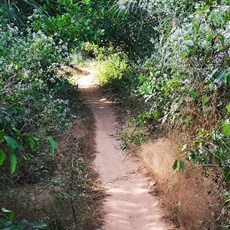
Border to Gillage
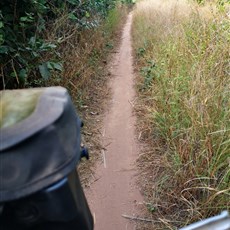
Border to Gillage
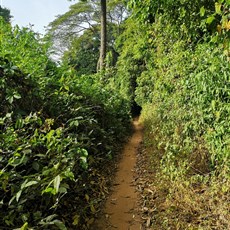
Border to Gillage
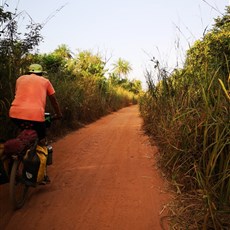
Border to Gillage
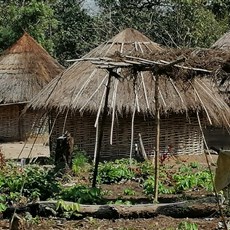
Border to Gillage